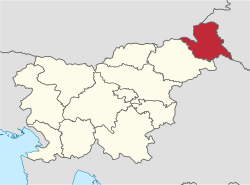Mura Statistical Region
|
Mura Statistical Region Pomurska statistična regija |
|
|---|---|
| Statistical region | |
 |
|
| Municipalities | 27 |
| Largest city | Murska Sobota |
| Area | |
| • Total | 1,337 km2 (516 sq mi) |
| Population (2015) | |
| • Total | 116,434 |
| • Density | 87/km2 (230/sq mi) |
| Statistics | |
| • Households | 44776 |
| • Employed | 33623 |
| • Registered unemployed | 9094 |
| • College/university students | 4133 |
| • Regional GDP: |
EUR 1.435 bn (EUR 12,267 per capita) |
The Mura Statistical Region (Slovene: Pomurska statistična regija) is a statistical region in northeast Slovenia. It is predominantly agricultural with field crops representing over three-quarters of the total agricultural area (twice as much as the Slovene average). Climate and soil combined have made it the region with the highest crop production, but its geographical position and inferior infrastructure put it at a disadvantage and it is the region of Slovenia with the lowest GDP per capita (EUR 12,267) and the highest rate of registered unemployment.
The Mura Statistical Region comprises the following 27 municipalities:
The population in 2015 was 116,434. It has a total area of 1,337 km².
Employment structure: 57.3% services, 39.9% industry, 2.7% agriculture.
It attracts 10.2% of the total number of tourists in Slovenia, most being from Slovenia (62.4%).
Coordinates: 46°39′00″N 16°10′00″E / 46.65000°N 16.16667°E
...
Wikipedia
